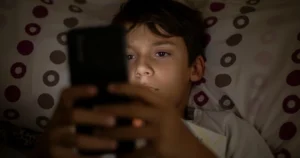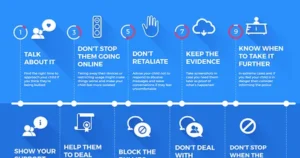How to deal with cyberbullying
Offer support and talk with your child about cyberbullying, remember to collect evidence, report it, block users and contact the school if needed.
Online safety advice video on best ways to deal with cyberbullying when it happens
Dealing with cyberbullying can be tricky and is often scary for both parent and child, but here are some things you can do:
Quick tips
5 things you need to know about dealing with cyberbullying
- It’s important to stay calm and offer your support
- Be led by your child on action to take to address the situation
- Be ready to listen and take action where necessary
- Don’t take away their devices as it may make them feel isolated
- Save the evidence and know where and how to get help and report
Should I approach the parents of a bully?
If the children involved are at your child’s school, it’s always best to talk to your child’s teacher first. You may feel you can discuss the bullying behaviour with the other child’s parent but always proceed with caution. It’s natural for a parent to defend their child, so make sure you’re calm and ask for their help to resolve the situation rather than accusing their child.
Remember they may have another side to the story. Your goal should always be to stop the bullying behaviour.
How do you talk about cyberbullying?
When a child experiences cyberbullying, they might feel scared, embarrassed or anxious. However, it’s important for them to talk about the experience with someone. Some children might not want to talk to you as a parent, so it’s also important to offer them alternatives. This could include be a helpline like Childline or a counsellor at school.
If you do talk to your child, remember to take it slow and give them time to put their thoughts together. Avoid letting your own nerves leave little space for them to talk. Learn more by exploring our conversation starter guides.
Should children block their bullies?
In some situations, it might be best to encourage your child to block or unfriend the person that caused them hurt, particularly if they’re an anonymous user or not known to your child. Your child might be reluctant to do this if they consider the person a ‘friend’ or they know the person from school or the local community. Revisit what it means to be a friend and talk about healthy online relationships.
And remember that most social media platforms give you options for reporting or flagging content that breaches their user guidelines. Be aware that the thresholds for offensive content varies according to the social network, game or app.
How to collect evidence of cyberbullying
Bullying is repeated behaviour and it can be helpful to keep a record of events in case you need to seek professional help.
For example, you might want to screengrab offensive content/save messages. It might not help your child to keep seeing these though, so offer to keep them somewhere safe and out of sight for them.
- Have regular conversations
- Steps children can take
- Involve your child’s school
- Report online bullying to the police
- Seek out counselling for cyberbullying support
- Top tips for dealing with cyberbullying
- Featured cyberbullying articles
Have regular conversations
Talk about cyberbullying
Talking to your child about cyberbullying is the first step in dealing with it. Start by creating opportunities to talk to your child in a relaxed environment; sometimes it can be less intense if you go for a walk or a drive rather than sitting face-to-face.
- Stay calm and ask open questions
- Listen without judging
- Praise them for talking to you
- Don’t take away their devices unless this is what they want. It’s likely to make them angry and increase feelings of sadness and isolation
If your child is bullying others online, talk to them about it, says Cybertrauma Psychotherapist Catherine Knibbs. “Explain that it must have been very scary, hurtful or confusing for them to want to hurt someone else.” Tell them that you understand and have been in ‘that place’ of feeling frightened, angry or hurt.
“Being able to say sorry can help children come to terms with their behaviour. And I’m sure most of them really are sorry. By speaking and connecting with our children in this way, we can help change the negative behaviours that so often accompany cyberbullying.”
Steps children can take
If your child sees bullying online, encourage them to take action — even if it’s between
people they don’t know.
Don’t start bullying others
When a child sees bullying online, it’s very easy for them to retaliate. Calling a person names, getting people to gang up on them and making fun of them are often ways someone might try to stop a bully. However, this only spreads bullying behaviour.
Although tempting, steer kids away from retaliation. Retaliating can have unpredictable consequences, make arguments last longer and make it harder to see who’s in the wrong. Instead, encourage your child to block and report, and to get support from a trusted adult.
Help them practise this skill with “Playing With Hate,” an interactive story from Digital Matters.
Stop arguments before they start
The digital space makes it easy for people to get into arguments. Because we can’t see others’ reactions, we sometimes say things we don’t mean, and so do children.
If they find themselves in a heated situation, encourage them to choose positivity. Instead of posting a comment in response to a troll, report it to the platform. Instead of responding to rude comments, leave the chat or group. Or, they can ask you for support if they’re not sure what to do.
However, if something starts to make them feel angry, children should step away to take a break and get support.
Be honest about your feelings
If your child sees something that hurts their feelings, they might feel like they need to laugh it off. Often, children don’t want people to make fun of them, so they hide how they feel.
Empower children to tell people when they’re hurt. Some children might not understand the impact of their words without another person telling them. This is particularly true for neurodivergent children.
If your child does not know the perpetrator who is posting content about them, you can both report it directly to the platform.
Involve your child’s school
If the person or people cyberbullying your child are from school, it is a good idea to contact your child’s teachers. It’s natural for your child to worry about what the outcome of this might be, so reassure them. Even though it might feel scary, it’s the only way for things to start getting better.
How the school responds will vary depending on their anti-bullying policy. All schools should have a policy and may have mentors or pastoral managers who can help.
Report online bullying to the police
There is not a UK law specifically against cyberbullying. However, bullying behaviours that happen online are criminal offences under a range of different laws. Such laws include the Malicious Communications Act 1988 and the Protection from Harassment Act 1997.
Cyberbullying that is sexually abusive or that targets your child’s ethnicity, sex, disability or sexuality should be reported to police. Additionally, report threats of harm towards your child or behaviour that encourages your child to harm themselves.
These are some forms of bullying (online or offline) that are illegal:
- Violence or assault
- Theft
- Harassment and intimidation over a period of time. This includes calling someone names or threatening them, making abusive phone calls and sending abusive emails or text messages. However, one incident is not normally enough to get a conviction
- Hate crime
The response you receive from police will depend on the nature and severity of the incident, whether it’s likely that a crime has been committed and whether your child is at risk of harm.
For further support, contact the Children’s Services department in your local authority.
Seek out counselling for cyberbullying support
The experience of bullying can place a huge strain on a child. In fact, research shows links to depression, anxiety and self-harm for those experiencing any form of bullying.
As a parent, you should always take it seriously and if you have any worries about your child’s mental or physical health, see your GP. If you need help talking to them about mental health, the Mental Health Foundation and Mind have some advice.
Alternatively, talk to your GP about available support. Many local counselling services offer a sliding scale of cost depending on your family income. It may even be free. This can be quicker than accessing support through your GP.
For information on counselling services in your area, visit the British Association for Counselling and Psychotherapy and make sure your child knows about Childline and other services available via phone, email or online chat.
Top tips for dealing with cyberbullying
Featured cyberbullying articles
 Q&A
Q&A
What can parents learn from the ‘Adolescence’ series on Netflix?
Experts share tips to help parents navigate discussions about 'Adolescence' on Netflix.
 Expert opinion
Expert opinion
What tech-facilitated abuse looks like in teenage relationships
Lauren Seager-Smith from The For Baby's Sake Trust explores what tech-facilitated abuse looks like in relationships and how to keep teens safe.
 News & blogs
News & blogs
What is undress AI? Guidance for parents and carers
Artificial intelligence continues to increase in ability and technology. Undress AI is one example that could leave young people open to harm.
 Expert opinion
Expert opinion
It takes a village: How male role models can challenge online misogyny
Learn about how male role models can impact young boys' views of girls with guidance from The NWG Network.
 Expert opinion
Expert opinion
How to counter online hate and extremism with young people
Hate and Extremism Analyst, Hannah Rose, shares insight into how young people might get involved online. Learn how to counter online hate.




